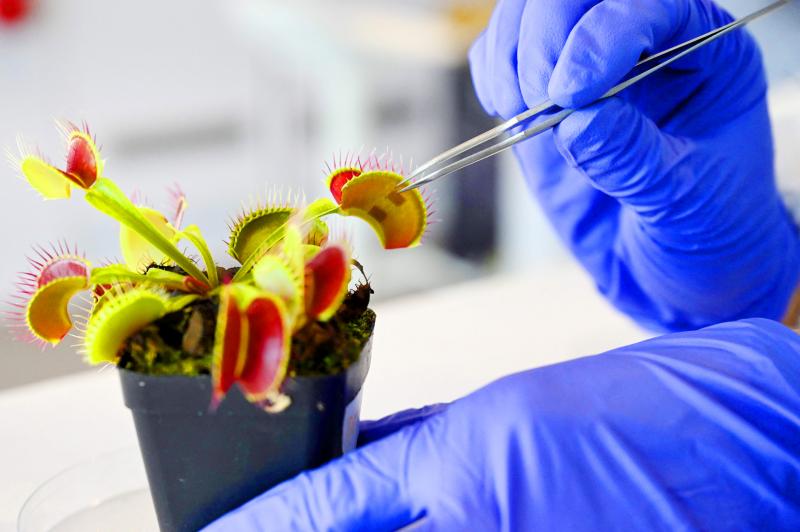Remote-controlled Venus flytrap “robo-plants” and crops that tell farmers when they are hit by disease could become reality after scientists developed a high-tech system for communicating with vegetation.
Researchers in Singapore linked up plants to electrodes capable of monitoring the weak electrical pulses naturally emitted by the greenery.
The scientists used the technology to trigger a Venus flytrap to snap its jaws shut at the push of a button on a smartphone app.

Photo: AFP
They then attached one of its jaws to a robotic arm and got the contraption to pick up a piece of wire half a millimeter thick, and catch a small falling object.
The technology is in its early stages, but researchers believe it could eventually be used to build advanced “plant-based robots” that can pick up a host of fragile objects which are too delicate for rigid, robotic arms.
“These kinds of nature robots can be interfaced with other artificial robots [to make] hybrid systems,” Chen Xiaodong (陳曉東), the lead author of a study on the research at Nanyang Technological University, told reporters.
There are still challenges to be overcome. Scientists can stimulate the flytrap’s jaws to slam shut, but cannot yet reopen them — a process that takes 10 or more hours to happen naturally.
The system can also pick up signals emitted by plants, raising the possibility that farmers would be able to detect problems with their crops at an early stage.
“By monitoring the plants’ electrical signals, we may be able to detect possible distress signals and abnormalities,” Chen said. “Farmers may find out when a disease is in progress, even before full-blown symptoms appear on the crops.”
Researchers believe such technology could be particularly useful as crops face increasing threats from climate change. Scientists have long known that plants emit very weak electrical signals, but their uneven and waxy surfaces makes it difficult to effectively mount sensors.
The researchers developed film-like, soft electrodes that fit tightly to the plant’s surface and can detect signals more accurately. They are attached using a “thermogel,” which is liquid at low temperatures but turns into a gel at room temperature.
They are the latest to conduct research communicating with plants.
In 2016, a Massachusetts Institute of Technology team turned spinach leaves into sensors that can send an e-mail alert to scientists when they detect explosive materials in groundwater.
The team embedded carbon nanotubes that emit a signal when plant roots detect nitroaromatics — compounds often found in explosives. The signal is then read by an infrared camera that sends out a message to the scientists.

POLITICAL PRISONERS VS DEPORTEES: Venezuela’s prosecutor’s office slammed the call by El Salvador’s leader, accusing him of crimes against humanity Salvadoran President Nayib Bukele on Sunday proposed carrying out a prisoner swap with Venezuela, suggesting he would exchange Venezuelan deportees from the US his government has kept imprisoned for what he called “political prisoners” in Venezuela. In a post on X, directed at Venezuelan President Nicolas Maduro, Bukele listed off a number of family members of high-level opposition figures in Venezuela, journalists and activists detained during the South American government’s electoral crackdown last year. “The only reason they are imprisoned is for having opposed you and your electoral fraud,” he wrote to Maduro. “However, I want to propose a humanitarian agreement that

Young women standing idly around a park in Tokyo’s west suggest that a giant statue of Godzilla is not the only attraction for a record number of foreign tourists. Their faces lit by the cold glow of their phones, the women lining Okubo Park are evidence that sex tourism has developed as a dark flipside to the bustling Kabukicho nightlife district. Increasing numbers of foreign men are flocking to the area after seeing videos on social media. One of the women said that the area near Kabukicho, where Godzilla rumbles and belches smoke atop a cinema, has become a “real

Two Belgian teenagers on Tuesday were charged with wildlife piracy after they were found with thousands of ants packed in test tubes in what Kenyan authorities said was part of a trend in trafficking smaller and lesser-known species. Lornoy David and Seppe Lodewijckx, two 19-year-olds who were arrested on April 5 with 5,000 ants at a guest house, appeared distraught during their appearance before a magistrate in Nairobi and were comforted in the courtroom by relatives. They told the magistrate that they were collecting the ants for fun and did not know that it was illegal. In a separate criminal case, Kenyan Dennis

DEMONSTRATIONS: A protester said although she would normally sit back and wait for the next election, she cannot do it this time, adding that ‘we’ve lost too much already’ Thousands of protesters rallied on Saturday in New York, Washington and other cities across the US for a second major round of demonstrations against US President Donald Trump and his hard-line policies. In New York, people gathered outside the city’s main library carrying signs targeting the US president with slogans such as: “No Kings in America” and “Resist Tyranny.” Many took aim at Trump’s deportations of undocumented migrants, chanting: “No ICE [Immigration and Customs Enforcement], no fear, immigrants are welcome here.” In Washington, protesters voiced concern that Trump was threatening long-respected constitutional norms, including the right to due process. The